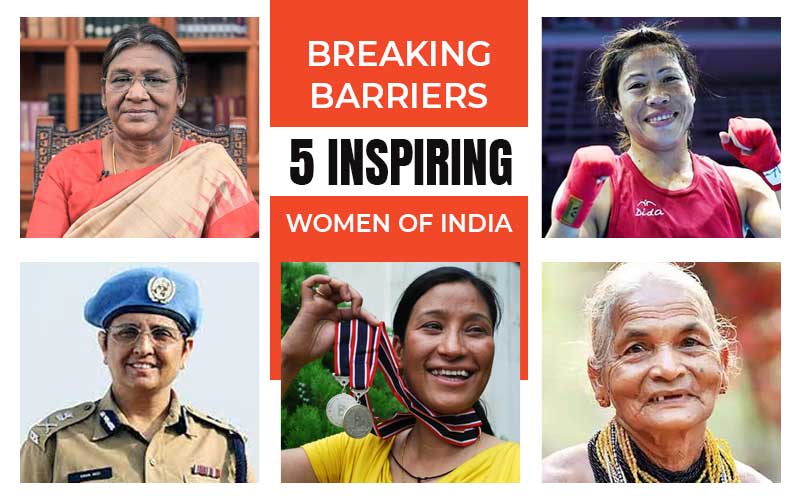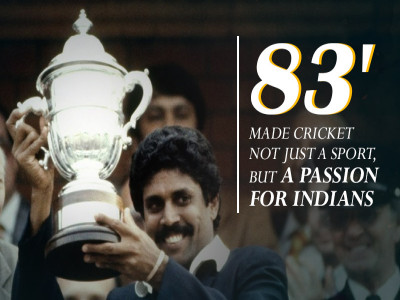
BREAKING BARRIERS: 5 INSPIRING WOMEN OF INDIA
Throughout history, women's rights
in India have faced suppression, limiting their opportunities. As daughters,
societal expectations burden them with responsibilities such as managing the
kitchen, caring for siblings, and handling household chores, all while serving
their parents. Following marriage, they enter a new universe, shouldering
similar duties but with different family members—those of their husbands. This
sad reality places women at a disadvantage compared to their counterparts,
daughters, who serve two families throughout their lives without receiving due
recognition for their contributions.
However, a recent wave of courageous and inspirational women has risen, challenging stereotypes and reshaping societal norms. In a nation where customs often dictate cultural expectations, these women have not only broken down barriers but have also emerged as trailblazers in their respective fields. Let's celebrate the achievements and recognitions of five exceptional Indian women from all walks of life (in alphabetical order), who continually empower and inspire, contributing to the positive transformation of society.
Anshu Jensempa:
Hailing from Bomdila in Arunachal Pradesh, Anshu Jensempa, is the first Indian woman to conquer Mount Everest twice within a few days. In 2017, Anshu Jamsenpa shattered the Guinness World Record for the fastest double ascent of Everest by a woman. She achieved this remarkable feat by first reaching the summit at 9:15 a.m. on 16 May 2017. Following a swift return to basecamp, she defied expectations by repeating the climb just five days later, summiting by 7:45 a.m. on 21 May.
Anshu, a mother of two, embarked on a remarkable journey as a mountaineer, earning recognition and accolades along the way. Her contributions to mountaineering were not her only feats; Anshu has also been recognized for her exceptional athleticism with the Arjuna Award in 1983. In 2017, former President of India, Ram Nath Kovind bestowed upon her the Tenzing Norgay National Adventure Award, India's Highest Adventure Award. In 2021, she received the Padma Shri Award, India's fourth-highest civilian award, adding another jewel to her illustrious career and acknowledging her outstanding achievements.
Her remarkable achievements have made her an inspiration to many, exemplifying the perseverance and unyielding spirit required to overcome seemingly impossible challenges. Anshu Jensempa's journey is an inspiration to many Indian women to push themselves beyond their comfort zones and aim for greatness in their own endeavours. It is an affirmation of breaking barriers.
Droupadi Murmu:
Droupadi Murmu is a leader who broke down gender and caste boundaries to become the first tribal woman to assume the prestigious office of President of India. She broke numerous records by becoming the first member of the tribal community and the second woman to hold the position of President of India, following Pratibha Patil. She is worth mentioning for being the first President born in an independent India and the youngest person to hold this esteemed position. Her historic election, which took place in her native Odisha, not only signalled a major turning point but also inspired and gave hope to underprivileged groups across the country.
Droupadi Murmu, who was born on June 20, 1958, as Puti Biranchi Tudu in Uparbeda, Odisha, first sought a career as a school teacher before entering state politics. Her teaching journey included work as a junior assistant at the irrigation department of the Government of Odisha from 1979 to 1983 and later as a teacher at the Sri Aurobindo Integral Education and Research Centre in Rairangpur from 1994 to 1997. Her commitment to education is evident as she taught subjects like Hindi, Odia, mathematics, and geography, choosing not to claim a full salary at the school.
Her rise to prominence represents a revolutionary change in Indian society by providing a forum for the voice and empowerment of women from all backgrounds. The journey of Droupadi Murmu is a monument to her ability to shatter stereotypes, fight for the rights of the oppressed, and bring about positive change not only for women but for all, around the country.
Kiran Bedi, the 'Crane Bedi':
Born as Kiran Peshawaria, Kiran Bedi, a trailblazing retired Indian Police Service officer, made history in 1972 as the first woman to join the Indian Police Service, breaking gender barriers. Kiran Bedi received the esteemed Ramon Magsaysay Award, also known as the Asian Peace Nobel Prize, in 1994 as an acknowledgement for her outstanding public work. Throughout her distinguished professional life, Bedi courageously took on corruption and led significant systemic reforms, gaining recognition for her unwavering, no-nonsense style. Many Indian women felt moved by her story and saw it as proof that they, too, could achieve positions of influence and power. She received the nickname 'Crane Bedi' for towing away the improperly parked cars which included then-Indian PM Indira Gandhi's vehicle for traffic control.
In addition to her revolutionary accomplishments in law enforcement, Kiran Bedi has demonstrated her tennis skills since she was just nine years old. She earned multiple victories at different zonal and national tennis events between 1965 and 1978, demonstrating her versatility. Her remarkable career has brought her many additional national and international honours, cementing her reputation as a woman who broke down barriers and devoted her life to helping and improving her society. The life of Kiran Bedi is an inspiration to determination, defying expectations of gender, and leaving a lasting legacy to society.
MC Mary Kom, the 'Magnificent Mary':
Hailing from Manipur in the Northeast of India, Mary Kom is a living embodiment of determination and resilience. Despite her humble background and numerous challenges, Mary Kom's journey led her to become a six-time world champion in boxing earning her the title 'Magnificent Mary'. The historic bronze medal she secured in the 2012 London Olympics marked a pivotal moment, making her the first Indian woman boxer to achieve such a feat. In another remarkable turn of events in 2015, Mary Kom achieved a milestone by becoming the first amateur athlete in India to surpass numerous professional counterparts in earnings, endorsements, and awards. This accomplishment not only solidified her status as a pioneer but also showcased her ability to transcend boundaries within the sporting world.
In 2013, the Indian government recognized her exceptional contributions to sports by honouring her with the Padma Bhushan, the third-highest civilian award. Beyond personal victories, her relentless pursuit of excellence has not only brought her global fame but has also paved the way for a new generation of women in India to boldly pursue traditionally male-dominated sports. Mary Kom's legacy continues to inspire, breaking down barriers and redefining what's possible for women in the realm of sports.
Tulasi Gowda, the ‘Encyclopedia of Forest’:
Tulsi Gowda, who was born in Honnali village, Karnataka, in 1938 into the Halakki tribal family is a personification of sustainable tribal Indian. She was given the title 'Encyclopaedia of Forest ' due to her extensive knowledge of a wide variety of plant and herb species.
She began planting and caring for trees when she was 12 years old, and to date, she has planted and raised over 30,000 saplings. The former President Ram Nath Kovind presented the Padma Shri, India's fourth-highest civilian honour, to this modest 85-year-old tribal woman at a ceremony in New Delhi in recognition of her exceptional commitment to environmental protection. In addition to the prestigious Padma Shri, Tulsi Gowda has been adorned with other honours, including the Indira Priyadarshini Vrikshamitra Award in 1986 and the Rajyotsava Award in 1999.
Regardless of everything, a woman remains true to her nature, embracing and nurturing those who seek protection. The story of Tulsi Gowda is inspiring and emphasises the critical role that community-based initiatives play in preserving and nourishing our planet for the benefit of coming generations. Her contributions to environmental preservation have been enormous, despite her lack of formal education.
These women are an inspiration to all; they are beacons of promise that push back against social norms and tear down barriers. Their accomplishments have made it possible for women to flourish and reach their full potential in an inclusive and equitable India. We must support and empower women from all walks of life as we honour these remarkable women, so they can help to create a more optimistic and forward-thinking India in the future.
Disclaimer: The opinions expressed in this article are those of the author's. They do not purport to reflect the opinions or views of The Critical Script or its editor.

Newsletter!!!
Subscribe to our weekly Newsletter and stay tuned.

















Related Comments